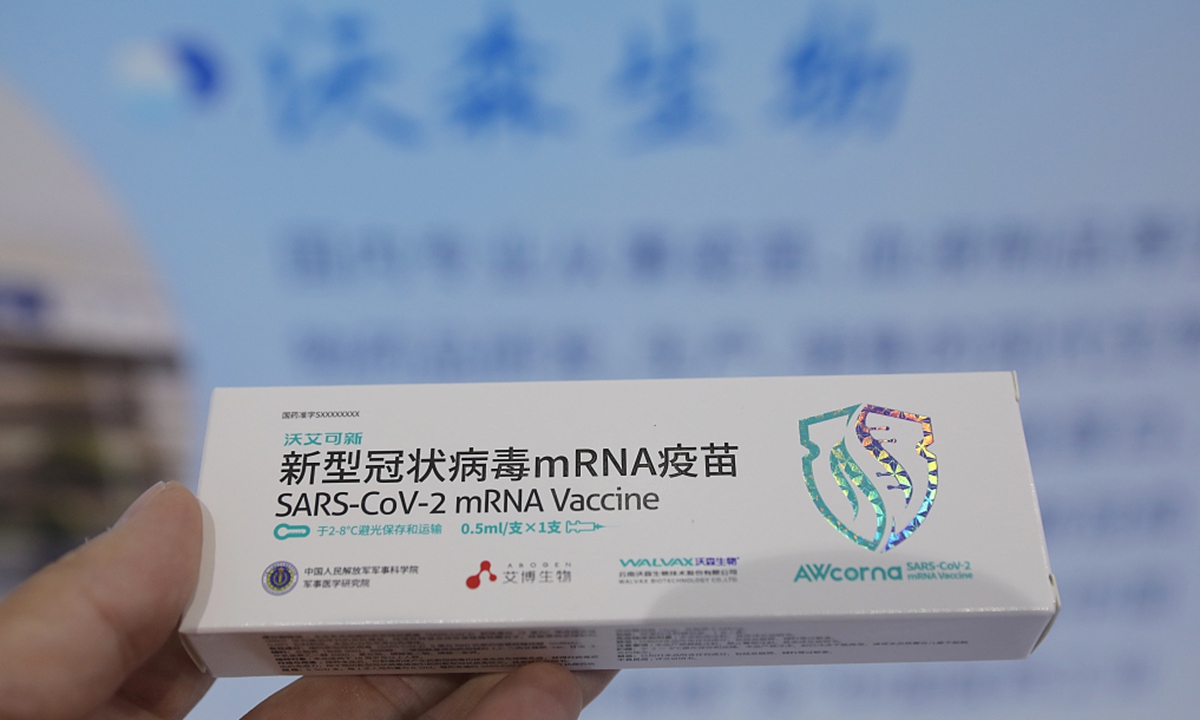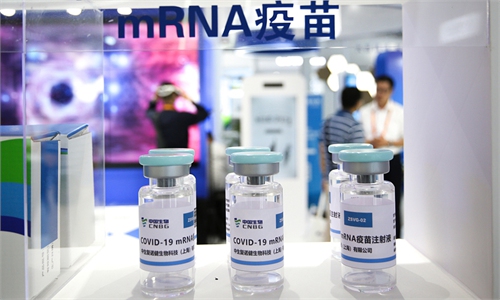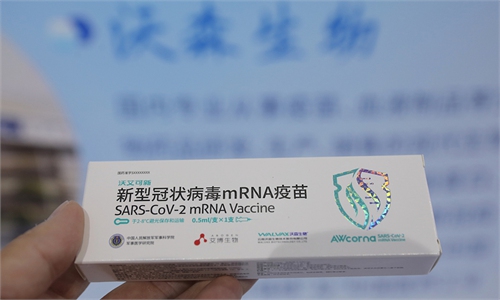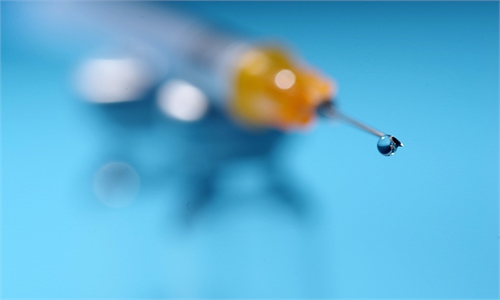China's domestic mRNA COVID-19 vaccine shows seroconversion rate as high as 95% in Phase I clinical trials: report

Photo: VCG
Two shots of China's first domestic mRNA vaccine candidate against the COVID-19 show seroconversion rates ranging from 80 to 95 percent, according to latest report on Phase I clinical trials published recently on The Lancet.
The mRNA candidate vaccine, ARCoVax, has been jointly developed by the Academy of Military Medical Sciences, Suzhou Abogen and Yunnan Walvax Biotechnology Co.
Between October 30 and December 2, 2020, 230 individuals were screened and 120 were enrolled in the Phase 1 trial conducted at the Shulan hospital in Hangzhou, East China's Zhejiang Province, according to the report published on The Lancet on Monday.
The enrolled individuals were all healthy adults aged 18 to 59 years and negative for SARS-CoV-2 infection. They were randomly assigned using block randomization to receive an intramuscular injection of vaccine or placebo. Vaccines were applied in doses of 5, 10, 15, 20 and 25 micrograms.
According to the report, after the first inoculation, only a few participants developed low traces of neutralizing antibodies, whereas after the second inoculation, most participants developed high traces of anti-SARS-CoV-2 neutralizing antibodies.
15 days after the second inoculation, seroconversion rates for the live SARS-CoV-2 neutralizing antibody were 80 percent in the 5 micrograms group, 90 percent in the 10 micrograms group, 95 percent in the 15 micrograms group, 95 percent in the 20 micrograms group, and 94 percent in the 25 micrograms group.
28 days after the second inoculation, seroconversion rates increased to a 100 percent in the 15 micrograms group, with levels ranging from 90 to 95 percent in the other groups.
The vaccine also shows good safety levels in the trial. No serious adverse reactions occurred during this trial. The most common adverse reactions reported were pain, itch and redness in the injection site, fever, headache, fatigue or malaise, muscle and joint pain, diarrhea, and chills. Most reported adverse reactions were mild or moderate in severity and about 95 percent resolved in the first 2 days after the first or second inoculation, according to the report.
The report concluded that ARCoV was safe and well tolerated at all five doses. The acceptable safety profile, together with the induction of strong humoral and cellular immune responses, support further clinical testing of ARCoV at a large scale.
ARCoV is also the first Chinese mRNA that has entered Phase III clinical trials after international Phase III clinical trials kicked off in May, according to media reports. Clinical trials on its efficacy and safety as booster shot are also on the way.
mRNA-based prophylactic vaccines have emerged as a leading platform for SARS-CoV-2 protection and are being investigated in basic and clinical research.
Two mRNA vaccines developed by Moderna and Pfizer/BioNTech have been approved for emergency use with more than 94 percent efficacy in Phase III clinical trials. Both vaccines choose the full-length spike protein of SARS-CoV-2 as protective antigens. But the ARCoV candidate encodes the receptor binding domain of SARS-CoV-211 as antigen.
Additionally, ARCoV was manufactured in liquid presentation and can be stored at standard refrigerated conditions (2-8 °C), while the Pfizer/BioNTech candidate has to be stored in temperatures of -80 to -60 °C.
"The results revealed in The Lancet's report show that ARCoV can induce a strong immune response which is in line with expectations," Zhuang Shilihe, a Guangzhou-based immunological expert, told the Global Times on Tuesday.
Zhuang noted that grasping mRNA technology is very important for China, not only to control the COVID pandemic but as treatment in cancer and rare diseases. Additionally, the convenience in storage is a major advantage for ARCoV to be used in developing countries and regions.
As to when the vaccine could be available for the Chinese people, Zhuang said that more information needs to be released, including results of Phase II and III trials, its efficacy to neutralize Delta and Omicron variants, as well as the estimated production and cost.
But Zhuang noted that the results of Phase I clinical trial show that the incidence rate of ARCoV is comparatively high, which requires more attention in Phase III clinical trials.
According to The Lancet's report, adverse events were graded according to the guidelines for vaccine clinical trials issued by the National Medical Products Administration. In China, about 50 percent of participants had grade 3 fever after the first inoculation, and 88 percent of participants in the 25 micrograms group did so after the second shot. When adverse events were graded according to the guidelines for vaccine clinical trials issued by the US FDA, 30 percent of participants had grade 3 fever in the 15 micrograms group.
In comparison, the incidence of grade 3 fever in the same 30 micrograms group in adults aged 18 to 55 years was zero in the US, 8 percent in Germany and 17 percent in China.



